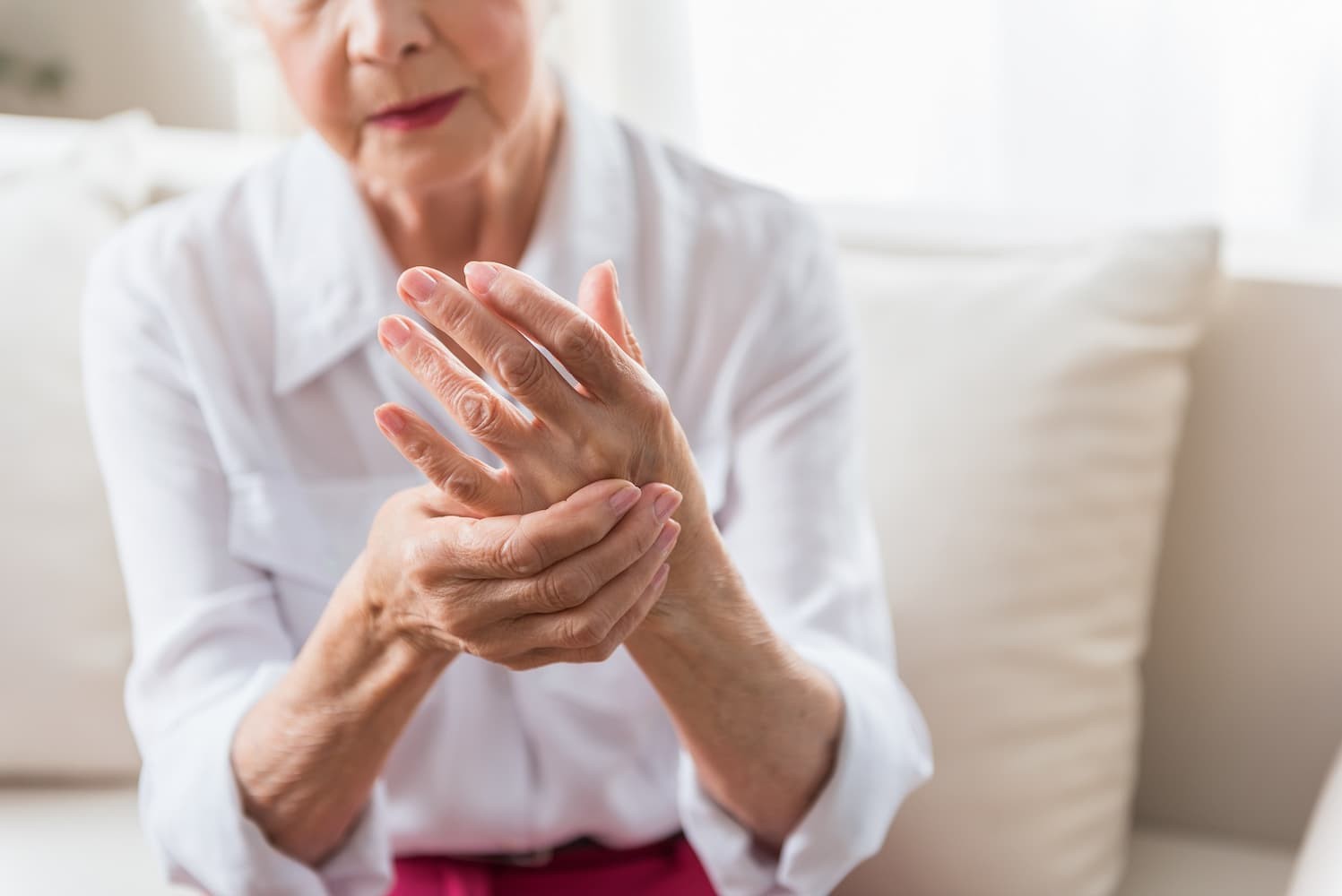
Every creak, ache or pain is tipped into the "arthritis" basket. That's a pity, because it's a frightening diagnosis for the owner, and not terribly helpful. Many times, the discomfort is not from a disease condition at all, and just needs some lifestyle changes. It's sometimes easily dealt with by diet, exercise or some other simple treatment.
What is Arthritis?
Millions of people around the world suffer the ordeal of arthritis. According to the Australian Arthritis Foundation website, arthritis "is an umbrella term for more than 100 medical conditions that affect the musculoskeletal system, specifically joints where two or more bones meet." The site goes on to say that a staggering 3.85 million Australians are affected by it, and that it costs the economy around $23.9 billion each year.
We're talking specifically about osteoarthritis. Other conditions like rheumatoid arthritis, while sharing the name, are a completely different disease.
The symptoms of arthritis include joint pain, stiffness, swelling and loss of range of movement. Often, a joint inflammation leads to secondary symptoms caused by the original ones such as loss of sleep, weight gain and even gastrointestinal troubles due to the drug treatment.
Most arthritis symptoms are common to many other conditions, and the same treatments can work well for them all.
Natural & Effective Treatments for Arthritis
There is no cure for arthritis, but it can be treated through natural arthritis treatments. There are many natural treatment options for arthritis, each varies in level of effectiveness. Talking with your doctor about arthritis treatment will help you find the best arthritis remedies available so you can live a more comfortable life without having to suffer from arthritis pain!
Exercise
Exercise reduces pain by increasing circulation, toning muscles and improving flexibility. Additionally, it allows you to maintain a healthy weight in order to hinder progression of osteoarthritis, which is the most common type of arthritis, as well as increasing your body's activity level. Weight loss is an effective way of reducing pressure on pain-causing joints.
However, make sure that your exercise routine is moderate or even gentle to start with, in keeping with the quality of the pain. Engaging in regular physical activity will also improve sleep and increase energy. The following exercises can help decrease arthritis pain and increase joint function over time:

- Tai chi is a perfect form of gentle effective exercise that's easy on joints.
- Water exercise, hydrotherapy, aerobics or gentle swimming work well because the water provides support for swollen joints, making it easier to exercise. Even better when the water is heated as this adds to joint comfort.
- Walking is a simple form of exercise that needs no equipment and can be done in short periods of time when it suits you.
- Yoga is ideal for people with arthritis as it promotes joint mobility, while also helping to relieve stress and pain associated with arthritis. But it needs to be done carefully. Depending on the severity of your condition, you might need to have a trained yoga teacher.
Healthy Eating
Weight gain is often a problem in arthritis because of the pain and loss of movement, so paying serious attention to diet is crucial. Generally speaking, there are certain kinds of foods which you should avoid if you want to get rid of your arthritis. Arthritis sufferers should avoid food containing high amounts of sodium such as processed food and takeaways. Salt contains a high amount of sodium, which causes water retention and contributes to arthritic joints. The emphasis should be on lots of vegetables and fruit, with small amounts of meat, grains and dairy.
A good diet plan for people with arthritis should consist of anti-inflammatory foods rich in antioxidants and omega-3 fatty acids to help reduce joint pain and swelling, while also helping them fight arthritis naturally. Some foods that comprise an anti-inflammatory diet include green, leafy vegetables, avocados, oatmeal, salmon, tuna, olive oil and nuts.
Food sensitivities may play a role in arthritis. They are different for everyone, so it's a good idea to pay close attention to when pain and joint stiffness occur and see if you can find any links. Keep a food diary.
Support
Joining laughter groups is just as important as a one-on-one support program, as they are a really good form of both therapy and support. Unlike many support groups, you won't spend the time focused on your discomfort. Instead, you'll be able to enjoy fun time free from responsibility. Or, funny videos will work nearly as well. Studies show that laughter produces endorphins or happy hormones which not only make us feel good but also reduce pain.
Social life is important, and if you don't have any or much, join something. Take up mahjong, magic, macramé or music – anything that takes your fancy, gets you away from your normal routine, and has other people that you can interact with.
Massage
Especially with aromatherapy, massage helps to relieve pain and improve movement. It also makes you feel fantastic and will help improve sleep.
Aromatherapy
Aromatherapy offers a number of essential oils which will help with painful joints.
- To ease stiffness and inflammation, 2 drops each of ginger, juniper and black pepper can be added to 10mls carrier oil to be gently massaged around sore joints
- To ease pain, 2 drops each of lavender, rosemary and chamomile can be added to 10mls of carrier oil and massaged into the painful area
Hot & Cold Therapy
Hot showers are often a good way to get the joints moving, especially if you're experiencing morning stiffness. Warm baths, with the addition of Epsom salts, plain salt and/or essential oils are comforting and sleep inducing.
As arthritis falls under the category of inflammatory conditions, you also want to do something about the chronic pain that comes with it. Cold packs can significantly relieve inflammatory arthritis, especially when you're suffering from a flare-up.
Herbs and Spices
Herbs and spices can be beneficial for treating arthritis. Herbal remedies reduce pain and swelling caused by inflammation while also providing increased mobility. This lowers stress on arthritis joints, allowing them to move more freely.
Herbs can be used in food or may be prescribed by a herbalist or naturopath. Ginger root, turmeric, boswellia, rosemary, thyme, oregano, garlic and cayenne pepper are all helpful arthritis remedies that you can easily find at home. A qualified herbalist can prescribe a mix and a strength to suit your particular needs.
Acupuncture
Acupuncture is one of the most popular natural treatment options for arthritis. Acupuncture treatments help people with arthritis control their pain by stimulating certain points on the body with very thin needles.
Physical Therapy
Physical therapy consists of exercises, stretches, massage, heat and cold treatments, and an array of other therapies to control pain caused by inflammatory arthritis. A physical therapist may recommend a variety of exercises, ranging from stationary bike riding or elliptical workouts in the gym to swimming or long walks in the park. All the modalities used in physical therapy have been proven effective at reducing pain levels associated with arthritis.
Arthritis is an autoimmune disease found through the whole population; it's not a simple, consistent condition, except that the joints are lacking in lubrication. People are often unwilling to move because they fear that they may damage joints or cause more pain. But without movement and lubrication, they seize up even faster and become stiffer and more painful.
A certified natural therapist can be a great help in managing arthritis, because there are many useful complementary therapies that can make your life much more comfortable.
For professional help with your arthritis, find a naturopath, dietitian, physical therapist, herbalist, fitness instructor or other natural therapists in your area through the Natural Therapy Pages' comprehensive list of health practitioners.
Originally published on Nov 16, 2011








